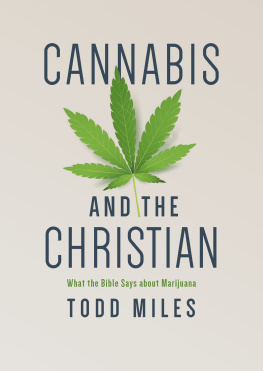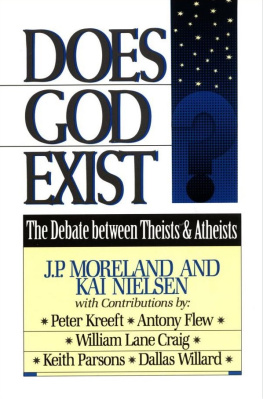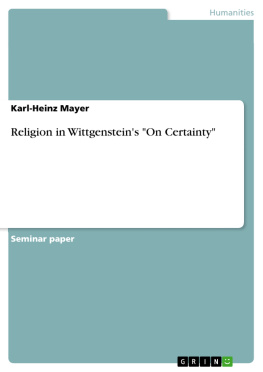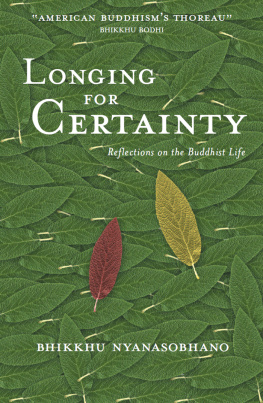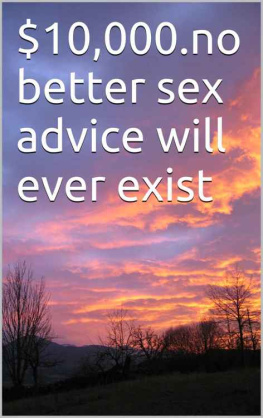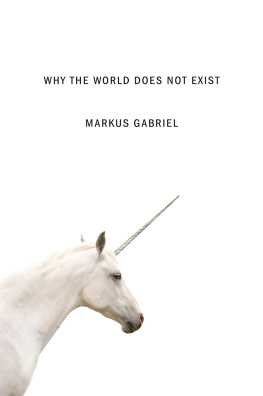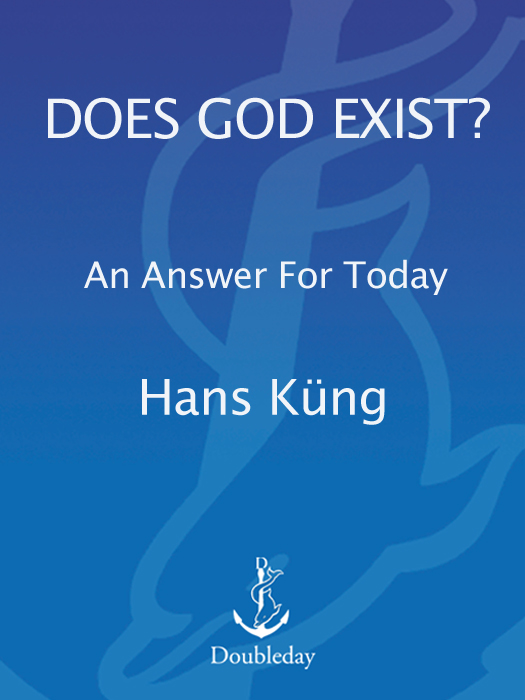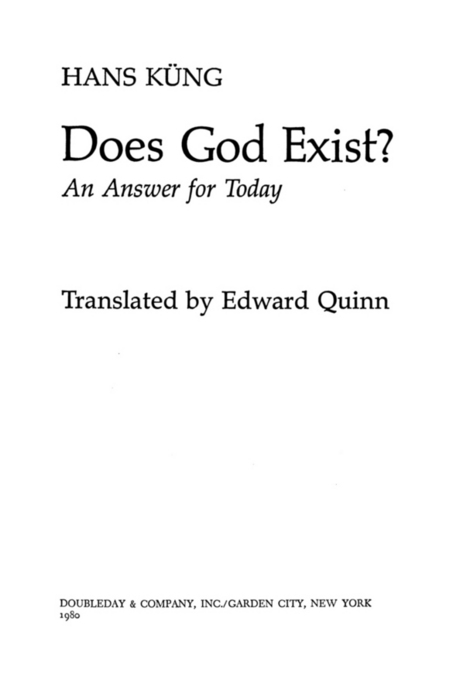The book was originally published in German under the title EXISTIERT GOTT?
( R. Piper & Co. Verlag, Mnchen, 1978).
eISBN: 978-0-307-82652-7
Library of Congress Catalog Card Number 796576
English translation copyright 1978, 1979, 1980, by Doubleday & Company, Inc.
All rights reserved
Excerpts from The Jerusalem Bible, copyright 1966 by Darton, Longman & Todd, Ltd., and Doubleday & Company, Inc. Used by permission of the publisher.
Excerpts from Paper 2, Obsessive Acts and Religious Practices, in the Collected Papers of Sigmund Freud, Volume 2, edited by Ernest Jones, M.D., published by Basic Books, Inc., Publishers, New York, by arrangement with The Hogarth Press Ltd. and The Institute of Psycho-Analysis, London.
Excerpts from Paper 21, A Childhood Recollection from Dichtung und Wahrheit, in the Collected Papers of Sigmund Freud, Volume 4, edited by Ernest Jones, M.D., published by Basic Books, Inc., Publishers, New York, by arrangement with The Hogarth Press Ltd. and The Institute of Psycho-Analysis, London.
Excerpts from Papers 19 and 25, Postscript to a Discussion on Lay Analysis and Why War? translated by James Strachey, in the Collected Papers of Sigmund Freud, Volume 5, edited by Ernest Jones, M.D., published by Basic Books, Inc., Publishers, New York, by arrangement with The Hogarth Press Ltd. and The Institute of Psycho-Analysis, London.
Excerpts from The Life and Work of Sigmund Freud, Volume 1, by Ernest Jones, M.D., copyright 1953 by Ernest Jones, Basic Books, Inc., Publishers, New York.
Excerpts from The Life and Work of Sigmund Freud, Volume 2, by Ernest Jones, M.D., copyright 1955 by Ernest Jones, Basic Books, Inc., Publishers, New York.
Excerpts from Friedrich Nietzsches The Gay Science, translated, with commentary, by Walter Kaufman. Copyright 1974 by Random House, Inc. Used by permission.
Excerpts from Friedrich Nietzsches The Will to Power, edited and translated by Walter Kaufman. Copyright 1967 by Walter Kaufman. Used by permission of Random House, Inc.
Excerpts from Friedrich Nietzsches The Genealogy of Morals, translated by Walter Kaufman and R. J. Hollingdale, and edited, with commentary, by Walter Kaufman. Copyright 1967 by Random House, Inc. Used by permission.
Excerpts from Gabriel Pascals Penses, translated by A. J. Krailsheimer. Copyright 1966 by A. J. Krailsheimer. Reprinted by permission of Penguin Books Ltd.
Excerpts from The Collected Works of Karl Marx/Frederic Engels. Copyright 1975 by Progress Publishers, Inc. Reprinted by permission of International Publishers Co., Inc.
v3.1
Ad maiorem Dei gloriam
Acknowledgments
This book was originally intended to be complementary to On Being a Christian. It emerged first of all from the necessity of keeping the earlier book to a manageable size and then grew in response to the need of entering more deeply into the question of God and of carrying out thoroughly a discussion with atheism and nihilism. What became increasingly clear to the author during the long years following his student days is recapitulated in the present book.
A number of colleagues have helped me with their advice: this I have acknowledged in the sections I asked them to read. But I want to thank Professor Walter Jens, as I did in On Being a Christian, for giving a critical reading also to this manuscript and for his suggestions for its improvement. I must likewise thank Professor Ludger Oeing-Hanhoff, whose judgment, based on his outstanding knowledge of the history of philosophy, was of the greatest importance throughout the whole book. I am grateful also to Frau Gudrun Oeing-Hanhoff for her attention to the emergence of the manuscript and for her devoted and accurate work on the corrections.
Among my academic assistants, I must first of all thank Dr. Karl-Josef Kuschel who stood by me with untiring energy, night and day, critically and loyally. Dr. Hermann Hring deserves gratitude for the way in which he made timealthough fully occupied with the publication of his own considerable workto go through the manuscript, scrutinizing it at every point. Dr. Georg Kraus, in addition to reading the manuscript, undertook with extraordinary energy the often wearisome task of verifying quotations, searching in libraries, assisting in drawing up the bibliography; as his successor, Dr. Urs Baumann checked the final proofs. The preparation of the manuscript was once more in the reliable hands of Dr. Margret Gentner, whowith Frau Ruth Sigrist assisting in the typing in Tbingen and Frau Marlis Abendroth-Knsel in Surseespared no effort patiently and expertly to prepare the pages in every chapter, which I had repeatedly retouched. Not least, however, must I thank Frau Marianne Saur-Kemmler for her splendid work on a discriminating index of some sixteen hundred names and whose judgment in reading the various versions of the manuscript was also valuable to me in a different way.
I would not like to miss the opportunity of thanking heartily Frau Renate Bhmeas representative of many who worked for me with extraordinary devotion in the Piper-Verlagfor taking care of the production of the book. Finally, in connection with the fifth centenary celebration of the University of Tbingen, it is appropriate to give a very special mention to the entire university library, which cannot be too highly praised and on which I have made frequent demands, this time in areas far beyond its excellent theological department.
Tbingen, January 1978.
Contents
Abbreviations
| CC | Corpus Christianorum seu nova Patrum collectio (Tournai/Paris, 1953 onward) |
| CSEL | Corpus Scriptorum Ecclesiasticorum Latinorum (Vienna, 1866 onward) |
| DS | Denzinger/Schnmetzer, Enchiridion symbolorum, definitionum et declarationum de |
The aim of this book
Does God exist? This question implies another: Who is God? The book is meant to give an answer to both questions and to give reasons for this answer. The question mark will be taken seriously, but that will not be the end of it.
Yes to God? For many believers, this has not been obvious for a long time. No to God? Neither has this been obvious for a long time to unbelievers.
Yes or no? Many are at a loss between belief and unbelief; they are undecided, skeptical. They are doubtful about their belief, but they are also doubtful about their doubting. And there are many who are even proud of their doubting. Yet there remains a longing for certainty. Certainty? Whether Catholics, Protestants, Orthodox, whether Christians or Jews, believers in God or atheiststhe discussion today runs right across old denominations and new ideologies.
We may, however, really begin to wonder if Christianity has not come to an end. Is it not all over with belief in God? Has religion any future? Can we not have morality even without religion? Is not science sufficient? Has not religion developed out of magic? Will it not perish in the process of evolution? Is not God from the outset a projection of man (Feuerbach), opium of the people (Marx), resentment of those who have fallen short (Nietzsche), illusion of those who have remained infantile (Freud)? Has atheism not been proved and is nihilism not irrefutable? Have not even theologians finally given up proving Gods existence? Or are we supposed to believe even without reasons? Simply believe? Can we not doubt everything except mathematics and what we can observe, weigh and measure? Would not the ideal be mathematical certainty? Or is there simply no ground for certainty?


